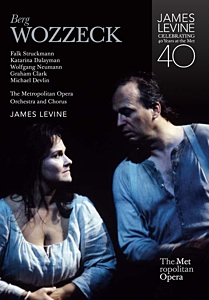A DVD of a 2001 Met performance of Berg’s Wozzeck is included in James Levine: Celebrating 40 Years at the Met – DVD Box Set, and it’s easy to see why this performance was chosen. Levine and the Metropolitan Opera Orchestra he has done so much to build and improve are the real stars of this Wozzeck.
Levine is in complete, masterful control of Berg’s complex score, and the orchestra playing is flawless—disciplined, exact, and emotionally nuanced. One of the best features of the DVD is that the camera is in the pit for all the interludes between scenes, and we can see clearly how well the orchestra responds to the maestro.
The 1922 opera (first performed 1925) is based on the play Woyzeck of Georg Buchner. When Buchner died at age 23 in 1837, he left only a series of unordered sketches or scenes; several attempts at ordering the play led to Paul Landau’s 1909 edition, and the play was finally performed in 1914. Berg was in the audience during the run, and began work on his opera shortly thereafter.
Both play and opera brutally and uncompromisingly tell a tale of a soldier being driven to madness and murder by rage, jealousy, and above all the exploitation of the poor by a cruel ruling class both military and societal. The recurring theme in the drama is the dehumanizing effect of grinding poverty, and how helpless the poor are to change their situation.
Mark Lamos’ production succeeds only partially in illuminating the drama. Both set and costumes (by Robert Israel) are highly problematic. The libretto constantly refers to the miserable conditions “we poor people” face; yet Marie’s rooms, which she refers to as “a hovel”, look like they’re furnished from IKEA. The clean, simple lines of the set design also seem out of place; one longs for a bit of mess that reflects the terrible deterioration of Wozzeck. And the costumes are in desperate need of distressing. All the clothes look freshly laundered, all the poor soldiers’ uniforms as natty as could be. Instead of etching a picture of the lowest hopeless rung of society, this production seems to depict momentary belt-tightening among the petite bourgeoisie.
Fortunately, we have the brilliant lighting design of James F. Ingalls, who clearly “gets it.” The stark use of white light is extremely effective, and the contrast between the warmth of Marie’s rooms and the icy coldness of the Captain and Doctor scenes is very telling.
Falk Struckmann is an effective Wozzeck, and happily does not fall into the trap of “playing madness.” He gradually shows the character’s agitation, beginning with the chilling early scene with his friend Andres when his hallucinations begin. He sings with authority, with a fine range of vocal dynamics. Katarina Dalayman matches him well as Marie and gives us a very effective piece of acting when she first fights off the attentions of the Drum Major, but ultimately gives in. The scene where Wozzeck kills Marie was beautifully played and sung with a palpable sense of tension and terror.
In the supporting roles, Michael Devlin scores with a frightening Doctor; Graham Clark is an idiosyncratic Captain, frequently over the top with his facial expression. Wendy White succeeds (as few do) in making Marie’s friend Margret an interesting character. Wolfgang Neumann’s Drum Major fails to establish the sexually attractive macho side of the role, though he was suitably creepy. The Andres of John Horton Murray makes little impact. Young Benjamin Pakman as Marie’s child is a surprisingly fine actor, even in close up.
But all in all, the story was told well and the final scenes have unmistakable impact. Berg (and Levine) sweep us along through this harrowing tale without ever letting the dramatic tension flag. The music, like the story, gives a strange but effective mix of beauty and horror. Levine and his orchestra serves Berg beautifully on this valuable DVD.




